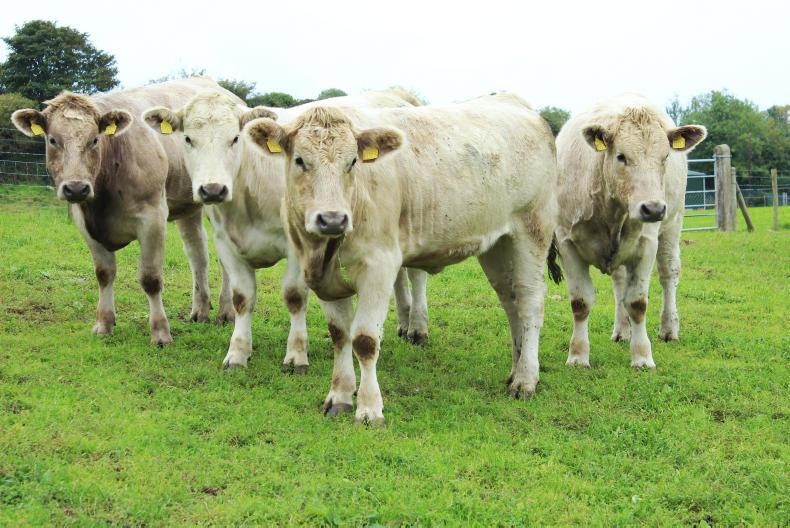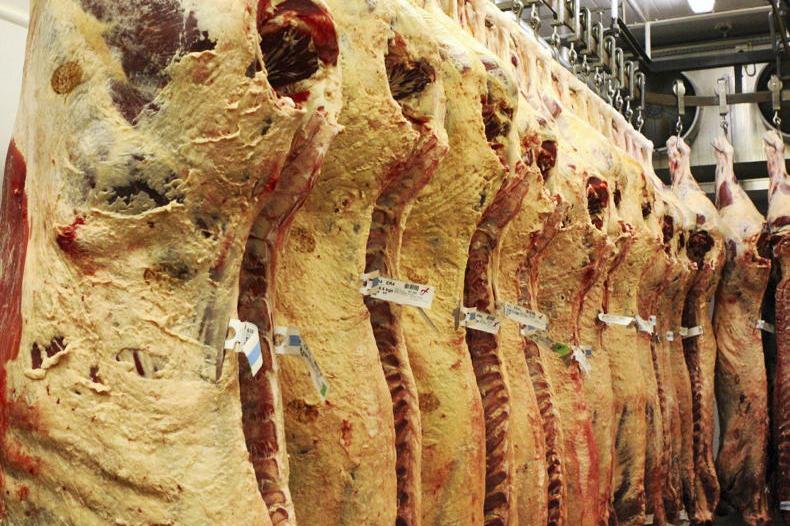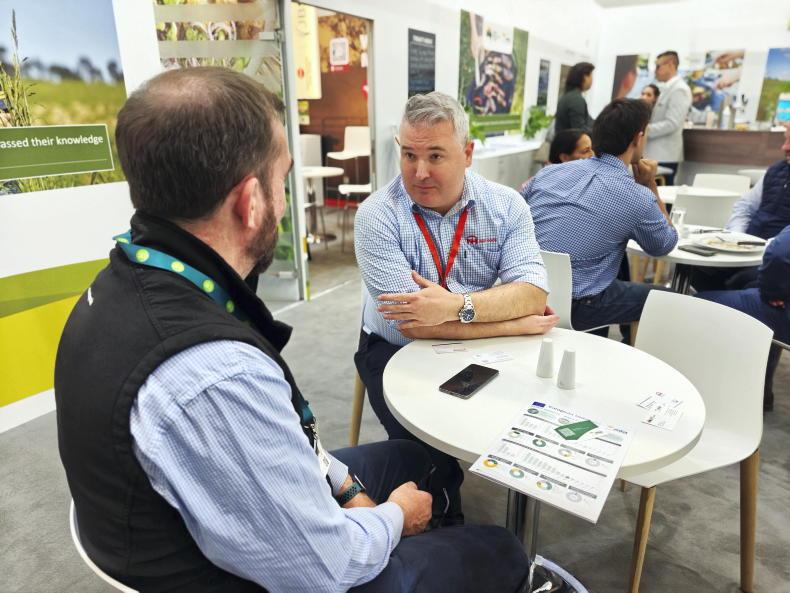Minister for Agriculture Michael Creed gave the Dáil some detail of the farmer assistance under discussion with Brussels in case of a no-deal Brexit this Tuesday.
Exceptional aid governed by the same EU rules as the successive EU dairy packages of €500m each made available in 2015 and 2016 would support beef farmers, Minister Creed said. This would be used to support the continuation of beef exports to the UK until a longer-term free-trade agreement is negotiated.
'Much more significant' than Russian embargo
"It will require exceptional aid and that's what provided for as well, and has been deployed previously by the commission in the context of the Russian market and the Baltic states, for example," Minister Creed said in reference to the Russian embargo on EU products at that time.
Brexit will be "much more significant" in scale and justify the use of this measure again, he added.
Meanwhile, measures to take products out of the market temporarily will be targeted to other commodities. "Intervention and aid to private storage would not be of much benefit in the context of the beef sector," the minister said.
"Perhaps in the cheddar cheese area, perhaps on the pork side, they could be of benefit to that sector. I don't want to rule any of them out."
The response will combine EU market stabilisation measures and exceptional aid with exchequer funding under relaxed state aid rules, he added, with details of the full package to be announced "in due course" in case a disorderly Brexit occurs.
It is a damage limitation exercise
On the positive side, Minister Creed said his previous estimate of €1.7bn in tariff costs including €700m on beef alone was based on the assumption that the UK would apply full WTO tariffs.
Now that the British government has clarified a range of tariffs, with the maximum rate on lamb but only a partial hit on beef and other products, the overall bill will be "somewhat less," he said.
"It is not possible in terms of Brexit preparedness to mitigate all the downsides," the minister warned. "It is a damage limitation exercise."
He came under strong pressure from opposition TDs to unveil details of his discussions with the European Commission on Brexit support for farmers.
Fianna Fáil TD Jackie Cahill said that "damage limitation is just not good enough" and farmers buying store cattle now need to know at what price level support measures will kick in. Deputy Cahill warned of a "doomsday scenario" if farmers had to rely on the intervention price.
This currently stands at €1.90/kg for an R3 steer.
Asked about border inspection posts, Minister Creed said the facilities at Rosslare port would be ready for the next Brexit deadline of 12 April. Regarding trade with Northern Ireland, he said: "We’re not preparing for a hard border infrastructure at all."
Brexit has already affected the market and prices
Meanwhile in Brussels, IFA livestock chair Angus Woods was chairing a meeting of the EU's civil dialogue group on beef and said farmers need €20 compensation per head of cattle for each 5c drop in the beef price.
"In a detailed analysis of the beef market by the Commission, it was accepted that there has been 'a dramatic fall in beef prices in Ireland' and 'Brexit has already affected the market and prices'," he reported.
With the 25c/kg drop in prices since last year costing farmers up to €100/head, and between €200 and €300 for young bulls, Woods said the Commission should make it clear now how it will use market and direct aid measures to remove uncertainty from the market.
Read more
Brexit debate three years late
No upside for Ireland regardless of Brexit outcome – ESRI
Fianna Fáil calls for beef price transparency and immediate Brexit aid
Minister for Agriculture Michael Creed gave the Dáil some detail of the farmer assistance under discussion with Brussels in case of a no-deal Brexit this Tuesday.
Exceptional aid governed by the same EU rules as the successive EU dairy packages of €500m each made available in 2015 and 2016 would support beef farmers, Minister Creed said. This would be used to support the continuation of beef exports to the UK until a longer-term free-trade agreement is negotiated.
'Much more significant' than Russian embargo
"It will require exceptional aid and that's what provided for as well, and has been deployed previously by the commission in the context of the Russian market and the Baltic states, for example," Minister Creed said in reference to the Russian embargo on EU products at that time.
Brexit will be "much more significant" in scale and justify the use of this measure again, he added.
Meanwhile, measures to take products out of the market temporarily will be targeted to other commodities. "Intervention and aid to private storage would not be of much benefit in the context of the beef sector," the minister said.
"Perhaps in the cheddar cheese area, perhaps on the pork side, they could be of benefit to that sector. I don't want to rule any of them out."
The response will combine EU market stabilisation measures and exceptional aid with exchequer funding under relaxed state aid rules, he added, with details of the full package to be announced "in due course" in case a disorderly Brexit occurs.
It is a damage limitation exercise
On the positive side, Minister Creed said his previous estimate of €1.7bn in tariff costs including €700m on beef alone was based on the assumption that the UK would apply full WTO tariffs.
Now that the British government has clarified a range of tariffs, with the maximum rate on lamb but only a partial hit on beef and other products, the overall bill will be "somewhat less," he said.
"It is not possible in terms of Brexit preparedness to mitigate all the downsides," the minister warned. "It is a damage limitation exercise."
He came under strong pressure from opposition TDs to unveil details of his discussions with the European Commission on Brexit support for farmers.
Fianna Fáil TD Jackie Cahill said that "damage limitation is just not good enough" and farmers buying store cattle now need to know at what price level support measures will kick in. Deputy Cahill warned of a "doomsday scenario" if farmers had to rely on the intervention price.
This currently stands at €1.90/kg for an R3 steer.
Asked about border inspection posts, Minister Creed said the facilities at Rosslare port would be ready for the next Brexit deadline of 12 April. Regarding trade with Northern Ireland, he said: "We’re not preparing for a hard border infrastructure at all."
Brexit has already affected the market and prices
Meanwhile in Brussels, IFA livestock chair Angus Woods was chairing a meeting of the EU's civil dialogue group on beef and said farmers need €20 compensation per head of cattle for each 5c drop in the beef price.
"In a detailed analysis of the beef market by the Commission, it was accepted that there has been 'a dramatic fall in beef prices in Ireland' and 'Brexit has already affected the market and prices'," he reported.
With the 25c/kg drop in prices since last year costing farmers up to €100/head, and between €200 and €300 for young bulls, Woods said the Commission should make it clear now how it will use market and direct aid measures to remove uncertainty from the market.
Read more
Brexit debate three years late
No upside for Ireland regardless of Brexit outcome – ESRI
Fianna Fáil calls for beef price transparency and immediate Brexit aid










SHARING OPTIONS